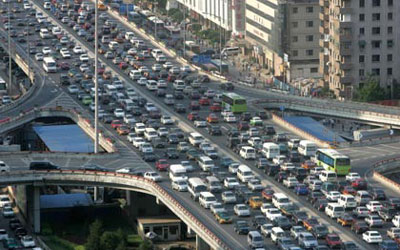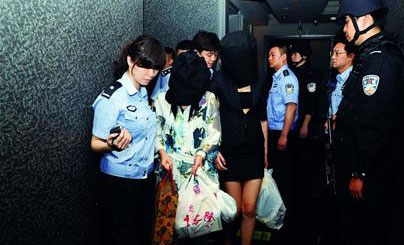Commentary from This Week's Paper

The Not-so-Potent "Cure" for Beijing Traffic
By Sheng Chao
Comment, page 16
~The Beijing Government has put forward various plans to deal with Beijing's terrible traffic jams, including the odd-and-even license plate rule, a congestion fee, and restricting non-local residents' vehicle purchases. These types of policies have been implemented before, and usually produce the opposite of their intended effect.
~The more restrictions we have, the worse the traffic in Beijing gets, because many people buy a new car to circumvent the restrictions.
~The fundamental cause of Beijing's traffic jams is poor urban planning. More and more homes are being built in the suburbs while manufacturing activity, businesses, government offices, and recreational sites are concentrated in the city center.
~In the short term, the government should steer its traffic policy away from additional restrictions and traffic controls.
Original Article: [Chinese]
Economic Growth has not Resulted in Income Growth
By Chen Zhiwu
Observer, page 41
~In China the proportion of workers' income to overall national revenue is falling.
~It is estimated that the hourly wage of Chinese manufacturing workers is only 3 percent of that of American workers.
~From 1990 to 2008, the increase of the average wage of China's laborers has been consistently lower than GDP growth.
~The reasons for this include restrictions on entrepreneurship, heavy taxation, and the high number of state-owned companies.
~If we want to deal with the situation, the hukou system must be put to an end. Workers should be given the right to unionize, the freedom to start a business should be protected, the political system needs to be reformed, land rights should be allocated to farmers, and rural financing should be open.
Original Article: [Chinese]

NDRC Should Deal with Industry Monopolies
By Jiang Lei
Economic Observer Online
~A new refined oil pricing reform is just around the corner. There are two key elements to the reform. The first is shortening the price adjustment time; the second is the removal of mandatory reports on price adjustments to State Council.
~But the new policy just side-stepped the major problem of industry monopolies.
~The first reform element intends to crack down on hoarding and speculation in the oil market, nothing more.
~The second reform element seeks to steer public attention away from the National Development and Reform Commission (NDRC) to PetroChina and Sinopec, companies that will assume the responsibility of announcing price adjustments.
~The new reform is mostly superficial, and cannot solve the oil pricing problem. Introducing a competitive mechanism and helping diversify the market and preparing for eventual marketization would be steps in the right direction.
Original Article: [Chinese]

Replacing the Term "Prostitution" with "Losing one's Footing" is Still Discrimination
By Shengchao
Economic Observer Online
~On December 11 2010, Liu Shaowu, Ministry of Public Security bureau chief said at a work conference, "We can now refer to prostitutes as women who have lost their footing. These groups deserve respect too." Thus, "women who have lost their footing" has become a new buzz phrase in the media.
~Officials feel that "prostitute" is a discriminative word, while "women who have lost their footing" sounds a bit more comforting.
~What does "losing your footing" mean? It means carelessly falling into a well. Women are not involved in illegal sexual practices because they were careless. They are either forced into it or participate out of their own free will.
~ "Prostitution" and "losing one's footing" are both problematic. They are scornful and contain implicit moral judgments. But as a legal term, especially in society ruled by law, the expression should be as objective and neutral as possible. So, in my opinion, the term "sex worker" is better.
Original Article: [Chinese]
The views posted here belong to the commentor, and are not representative of the Economic Observer |
Related Stories
Popular

- INTERVIEW
- Interview with Václav Klaus - President of the Cze...
- "I do not think there is a problem with our climate"
Interactive
Multimedia

- EEO.COM.CN The Economic Observer Online
- Bldg 7A, Xinghua Dongli, Dongcheng District
- Beijing 100013
- Phone: +86 (10) 6420 9024
- Copyright The Economic Observer Online 2001-2011
















